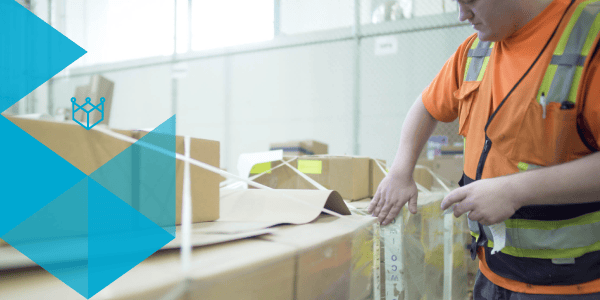
Landing a deal with a big box retailer is often a major milestone for any business. Retail partnerships can drive significant sales volumes and expand brand visibility on a national or even global scale. While getting your products into these stores is a business win, actually shipping to those retailers brings a whole new level of complexity to your logistics strategy. That’s because retail logistics and fulfillment can often be controlled by strict routing guides, precise packaging requirements, tight delivery windows, and more. Failing to meet those standards leads to delays, chargebacks, and strained relationships, all of which can quickly erode profit margins.
At King Solutions, we specialize in navigating the complexities of shipping to major retailers. We can help you get it right, starting with helping you understand the challenges and what your business can do to overcome them.
Retailers Run on Precision, and Expect the Same from You
Big box retailers operate on fast-moving, high-volume supply chains designed to keep shelves stocked. As a result, they often impose detailed requirements on their suppliers. Everything from the way shipments are labeled to the type of pallet used, the day and time items arrive, and many other precise details are often set in stone.
These requirements are laid out in routing guides, which differ from retailer to retailer and can be dozens (even hundreds) of pages long. These large documents dictate:
- How and when to schedule deliveries
- What documentation must accompany each shipment
- Labeling and packaging specifications
- Which carriers or modes of transport are allowed
- EDI (Electronic Data Interchange) requirements
- Preferred pallet configurations and handling instructions
Chargebacks Can Erode Profitability Quickly
One missed step in shipping to large retailers can result in chargebacks—penalties assessed when shipments don’t comply with routing guides—that range from a few hundred to several thousands of dollars per incident. These chargebacks can add up, increasing your shipping costs over time and quietly eating away at your margins if not managed carefully.
Common reasons for chargebacks include:
- Late deliveries or missed dock appointments
- Incorrect or missing labels
- Improper packaging or palletization
- Missing or incorrect paperwork
- Noncompliance with EDI requirements
What makes chargebacks particularly dangerous is that they often go unnoticed. They will often be buried in monthly vendor performance reports or financial summaries. Many suppliers don’t fully understand how much they’re losing to compliance penalties until the damage is done.
Working with an experienced logistics partner like King Solutions can drastically reduce chargebacks. We understand the expectations of major retailers and build systems to ensure your shipments arrive exactly as required, every time. While chargebacks can sometimes be unavoidable, we help you minimize them—and build predictability into your shipping process so you can plan ahead and avoid unexpected fees.
Dock Appointments Are Non-Negotiable
Unlike standard B2B deliveries, shipments to large retailers often require dock appointments—time slots that must be scheduled in advance and followed precisely. Miss your appointment, and you’re not just rescheduling—you’re likely facing a fine. This is just one of many chargebacks that shippers can incur.
To complicate matters further, many retailers require you to use a preferred carrier, limiting your control over timing and increasing the risk of delays. These dock appointments add another layer of complexity to the planning and execution of your shipments. Transportation delays, miscommunication with distribution centers, or incomplete paperwork can all lead to missed appointments. Once a delivery is rejected or delayed, the ripple effects can disrupt your entire supply chain.
At King Solutions, we help clients navigate this process by managing dock appointments directly, routing with the required carrier partner, and coordinating with retailers’ receiving teams to ensure freight arrives on time, in compliance, and with all required documentation.
Freight Modes Impact Cost and Timing
Whether you’re shipping LTL (less-than-truckload), FTL (full truckload), or using a freight consolidation strategy, the freight mode you choose can impact the timing and costs of your shipments.
For smaller or more frequent shipments, LTL might seem like the most cost-effective option, but it also introduces more transfer points and a higher risk of delay or damage. For large-volume shippers, FTL offers more control, but at a higher cost.
Freight consolidation, which allows you to combine multiple smaller shipments into a single full truckload, is often the ideal middle ground, especially for businesses that aren’t quite at full truckload volume but need more predictability and cost control than standard LTL offers.
At King Solutions, we help you factor in cost, speed, volume, and the specific requirements of the retailer when choosing your shipping mode. We’ll analyze your retail commitments and design the most efficient shipping strategy based on your business needs and your shipping destination.
Don’t Forget About Visibility and Documentation
Real-time visibility and accurate documentation are often necessities in retail logistics. Large retailers want instant access to shipment updates to coordinate the receiving of their incoming stock. They expect accurate paperwork, synced EDI transmissions, and timely proof-of-delivery. Suppliers who can’t provide this level of transparency risk being flagged as unreliable, a label that’s hard to shake and damaging to long-term relationships.
At King Solutions, we offer end-to-end visibility, from our warehouse to the retail destination. Our technology integrates with your systems and provides real-time tracking of your shipments and reporting tools that keep you informed every step of the way.
Scale your Retail Shipments
Shipping a few pallets to one retailer is one thing. Scaling to supply dozens of stores across the country, or supplying multiple retailers with different requirements, is something else entirely.
To scale successfully, you need:
- Reliable carrier networks
- Flexible warehousing and fulfillment options
- Automated systems for label generation and routing guide compliance
- People who understand retail logistics inside and out
That’s our specialty here at King Solutions. We provide the infrastructure and experience needed to grow sustainably and with confidence. Whether you’re expanding into retail for the first time or looking to optimize an existing program, we bring the operational support and strategic guidance that makes scaling simple, not chaotic. We’ve helped manufacturers, distributors, and growing brands navigate the most demanding retail supply chains, from routing guide compliance to freight optimization and chargeback prevention. Ready to simplify your retail shipping? Let’s talk about how we can help you deliver every single time.







 Joel Rice
Joel Rice